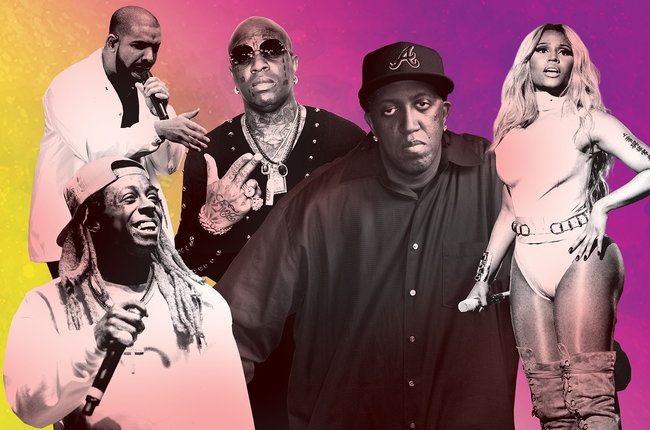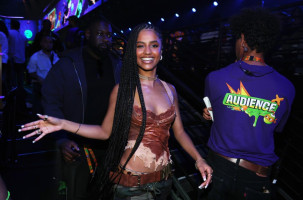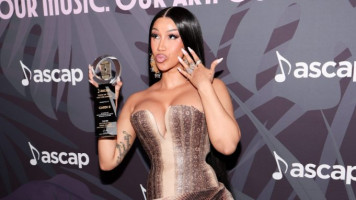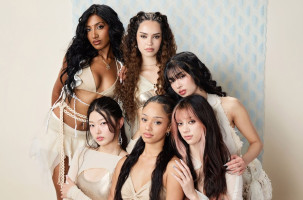Bryan “Birdman” Williams is easy to find -- if you know where to look. The 48-year-old co-founder and co-CEO of Cash Money Records established a hip-hop empire that has reigned for 20-plus years by sticking close to one place: the studio. “We live in there,” he says. “Just working, bro. Same sh-t, different day.”
Williams is only briefly distracted during this conversation in March by the controversy over a new track from rapper Rick Ross. On “Idols Turned Rivals,” Ross -- who has collaborated with Cash Money stars Drake, Lil Wayne and Nicki Minaj -- calls out Williams by name. He alludes to lawsuits over royalties. “Last request,” raps Ross, “can all producers please get paid?”
“I don’t get caught up in that,” says Williams dismissively, in his New Orleans drawl. “Numbers don’t lie, and that’s all I give a f--k about: numbers, and putting them up.”
One week later, his older brother and fellow Cash Money co-founder/co-CEO Ronald “Slim” Williams, 49, is reacting to a different set of headlines: Drake, whose “playlist” album More Life was released five days earlier by Cash Money/Young Money/Republic, is on pace to tally 384.8 million streams in one week, shattering a record Drake himself set the previous year with his album Views.
Such is life for the Williams brothers: down one week, up another, but always putting numbers on the board.
When Birdman and Slim launched Cash Money in New Orleans in the early 1990s, however, it was headlines -- and harsh realities -- about their city's skyrocketing murder rate that the two were trying to escape. "A lot of violence, a lot of drugs, killin', especially in those days," Birdman says. Adds Slim, "You had to be a survivor to last."
The brothers would know: Their mother, affectionately known as Ms. Gladys, was shot and killed when they were toddlers; their younger brother Eldrick Russ, an aspiring rapper, was killed at age 20; and their father, who raised them in a barroom in the city, died before seeing his sons’ ambitions realized. Birdman admits to “being incarcerated a lot” growing up, including a 22-month sentence stemming from a drug possession charge.
That stint behind bars -- as well as Russ’ death -- led Birdman to change his life and launch Cash Money Records with Slim in 1991. They sold CDs and t-shirts out of the trunks of their cars, in housing projects around New Orleans and, later, throughout the American South. The regional success of Get It How U Live!, the debut album by the Hot Boys -- comprising Juvenile, B.G., Turk and a 15-year-old Lil Wayne -- in 1997 sparked a bidding war among major labels in New York and Los Angeles, with executives intrigued by Cash Money's ability to conquer their market effectively on their own.
That interest led to Cash Money’s landmark distribution deal with Universal Music Group, signed in March 1998 for a reported $30 million, with a $3 million advance. What followed was a run of success with the Hot Boys, both collectively and as solo artists, as well as acts like the Big Tymers (Birdman and producer Mannie Fresh) and label collective Cash Money Millionaires. In the two decades since, working with longtime attorney Vernon Brown, the Williams brothers have brought their hip-hop from the housing projects to the Billboard Hot 100.
When the Hot Boys broke up and the Big Tymers disbanded in the early 2000s, Lil Wayne became the label’s signature star. As a solo artist, he has charted nine top five albums on the Billboard 200, including the four-part Carter series, and achieved three No. 1s. He has sold 15.8 million albums in the United States, according to Nielsen Music, picked up 26 Grammy nominations, winning five, and in 2005 launched his Young Money Entertainment imprint.
It was Young Money that would usher in Cash Money's third evolution, led by Wayne, Minaj and Drake, who have collectively dominated the hip-hop landscape since the latter two came aboard in 2009, selling a combined 14.3 million albums between them. “Sometimes I’m just blessed with that foresight and can see it a mile away,” says Birdman about his current trio of chart-toppers. “And I saw stardom in all three of them from day one.”
Cash Money today has a rising roster of new artists, including Young Greatness and Jacquees; a three-part documentary, Before Anythang, that chronicles Birdman’s early life, set for a May 12 release; and a new Minaj album due later this year. And despite the issues between Birdman and Lil Wayne -- competing lawsuits over royalties and payments, and Lil Wayne’s insistence that Birdman has been withholding the release of Tha Carter V -- Cash Money is still thriving, still putting up numbers, just as the label has always done.
“Every time they said we were down, we’d come back and show that we were different,” says Slim of the label’s durability over the past two decades. “We did things that no one else has done, and we did it our way.”

Let’s get to this right away: How are things with Lil Wayne now?
Birdman: Carter V coming out this year, man. Wayne my son, and it’s just that simple. Carter V definitely coming out, though.
Tell me about the three-part documentary Before Anythang.
Birdman: It starts from the beginning of my life growing up in the homes, just being a lost kid up until I started in the music business and signed with Universal. That’s part one, up until we get into the music business.
Why did you want this to focus on the early years?
Birdman: It's the only way to tell the story. I wanted to start from the beginning, even before me, before I was even born, with my mother and my father. Everything comes from my pops and my moms, so I wanted to start from the beginning before I was even created, up until just being a young man, being incarcerated a lot, up until going to jail and changing my life.
What was life like growing up for you in New Orleans?
Birdman: New Orleans just a hell hole, man, it's just a different lifestyle. Forty years ago when I was a kid, it was even worse back then. Just growing up in the projects. The sh-t that we thought was right, not having been taught right that that sh-t was wrong, until we got older and learned what's right and what's wrong.
Slim: There was rough times, there was good times. When we were growing up our mom died when we was young, and our dad died right before we had our deal. Just dealing with all that, it was just every day life. It was just a tough game.
What are some of your earliest music memories?
Birdman: My daddy had a barroom, so we heard music all day. Then my little brother, he rapped a lot; that was his thing, rapping. And it really made me want to fulfill his dream, because he got killed really young. And that’s what made me get into music, period, after he got killed.
Slim: We used to go to record stores and buy music all the time. Tim Smooth -- who passed, rest in peace -- had a concert and we went and were amazed at the reaction of the people. We just wanted to get in the business.
Did you know how the music business worked before you started Cash Money?
Birdman: Nah, I learned from trial and error. I made mistakes and I learned from my mistakes. I studied other people who was in the business, but I just started with no know-how, and really just started from nothing and turned it into something.
Slim: I was blind to the check, all of it. But I pick up quick. I started putting things together myself, what this takes, what that's like. When we first started, I was just like, "I'm gonna start a record company," but nobody would ever tell us [how]. I just figured it out. I was like, I'm gonna need a lawyer, I knew that, we incorporated the name and I just started putting things together. I watched a lot of the other guys who came before me and I just gathered my information by watching them and putting it together.
How did you find artists back then? How did you first meet the Hot Boys?
Birdman: They were all from my neighborhood, except Wayne. B.G. from my neighborhood, Turk from the project I grew up in; I just knew all of them and I put them all together. And I named them the Hot Boys, because we already was a crew calling ourselves the Hot Boys, and I thought that would be a good rap name. Everybody knew us as Hot Boys; we had peppers, hot shirts with peppers on 'em, that was what our thing was.
Slim: We always ran across people. B.G. flourished with Wayne. We saw Juvenile at the bus stop, he was coming from work, my brother saw him and I signed him at the studio the next day. Then Magnolia Shorty introduced us to Turk, and that's what formed the Hot Boys.
How did you get the attention of the majors, including Universal?
Slim: Back in those days, you had to go to different distributors to sell your music. And we had a man, Robert Guillerman [of American Southwest Music Distribution], out of Texas, and he was selling us wholesale, and I sat down to talk to him and said, “Man, I got an idea, let’s see what we can do -- you be the only distributor and you pay us all that.” Once I started doing that, it really started spreading.
Birdman: We had gotten a little too big for the distribution companies. They were selling us wholesale, Mr. Robert Guillerman, who was a great man, and Gonzales Distribution, and we had gotten to the point where we had outgrew them; they were behind millions of dollars, and we just felt like it was time. We was generating a million dollars every other month, just being independent. And I felt like it was time for us to take it to the next level.
Slim: We was doing big numbers, and one of the reasons why was because of the way we had it set up with Southwest. If we would've stayed, we coulda did way more than we did, but Universal came and I wanted to expand the music further. I knew how talented they was and what the world was gonna get to see, how they were in competition with each other to be great. And that's one thing I really loved about them: everybody wanted to have the hottest verse, and that helped each one of them to be the best.
What were those early negotiations with the majors like?
Birdman: Everybody was trying to take half my company and I wouldn’t allow that. I felt like, “Why would I work this hard and give y’all half?” I wouldn’t give nobody nothing but a distribution fee, and nobody would do the deal with us. Except Universal, Mel Lewinter and Doug Morris.
Slim: A few of [the majors] told us that our lyrics were too hard. Universal had what I was looking for, the marketing and everything. We know how to make great songs, we just needed people to market it and support the records. They had the machine.
How did the Universal deal change what you guys were able to do?
Birdman: It opened us up to a broader audience. And Miss Jean Riggins [president of black music at Universal Records] sat me down and showed me how the system works. We were used to just dropping a new album every two weeks, and she took the time to teach me and show me how to set the record up: She showed me how to sell millions of records. And I sat down and I listened to her and learned from her and she told me the system. And once we learned how sh-t operates and how to set up records it paid off for us.
Slim: Miss Jean Riggins really taught me a lot about the business end. She was like, "You're not just doing this for New Orleans, you gotta educate the world about y'all's style and y'all's culture and the way y'all speak." And I was getting a little upset about the whole situation, because in my mind I had an idea of the way I wanted to do it, and she had another plan, and I sat there and listened to her and I didn't say a word and then I left. And then when I got outside her office I said to my brother, "Man, we gotta go back home to New Orleans, 'cause we got a lot of work to do."
When I got back to New Orleans I called her back and apologized to her for the way I acted and I told her, "I wanna learn." And she was like, "You know what, young brother? I'm gonna make you a millionaire." And she kept her word. She did everything she said she was gonna do. And I will never forget that conversation that we had. Everything I went through, she stopped me in my tracks and she taught me about educating the world. Because we put out that record, [Juvenile's] "Ha," and what she said was true; nobody could understand it. But she taught us a lot, she really did. You know, coming from the streets of New Orleans, people died young. It just made us proud and happy that we were able to help other people.
When the Hot Boys broke up by 2003, that seemed like the end of an era for Cash Money. How do you feel about that time period?
Birdman: I didn't really ever want to see the breakup; I didn't even think this type of sh-t would happen, 'cause I knew we was all in it together. And it kind of made us look like we was gonna fall. But when it comes to creativity, business, music, I really put that sh-t in them. I taught 'em that. Once that happened, me and Wayne just said we gonna do it ourselves. I taught them everything they know, so if they learn to do they own thing they have my blessing. But I just knew for a fact it was gonna be hard for them to survive 10, five years without no guidance in this sh-t. It don't work like that.
Slim: I was disappointed that everything went the way it went. You know, we never really spoke about what really happened, none of the real stories ever got told, 'cause I ain't with the mess. I'm an executive chairman to my company, and it ain't for me to be out there and bashing an artist or saying different type of things. But it was a disappointing time. The same people that was trying to break us up didn't know what was going on.
From there, you guys transitioned with Wayne as the breakout solo star. How did that change Cash Money and how you guys operated?
Birdman: Once they left, we just took it upon ourselves, and I really knew it was gonna be all about Wayne. It wasn't gonna be about me no more at that point. I wanted to put it all on him, let him take over and do his thing. 'Cause he was young, and I knew he really, really had it out of all them anyway. We built him for what he's doing and what he did. And he just took the sh-t and ran with it.
Slim: We just had to make that transition, because Juve left, Fresh wanted to leave, everybody just wanted to really do their own thing. And I just think they didn't go about it the right way, but it happens like that. We was kind of upset about the whole situation, but Doug Morris was like, "You know what Slim? Welcome to the music industry." He told me, "Don't get involved with the gossip part of it." I learned that from him: "Don't get into that."
Birdman: Once they left, I was like, f--k 'em, I'ma do me, let them do them. It was fun in the beginning, but it ended up being pain at the end for them. 'Cause they ain't last, not one of them; any n---a that left, they ain't last at all.
Slim: We just had to add to what we already had, with more people, more manpower. It's like cooking a steak and you got certain salts you wanna add to it to upgrade it, that's what we did. That's what helped us to deal with the massive attention and everything that was going on with those records.
Lil Wayne launched the Young Money imprint in 2005. How did that reinvigorate Cash Money?
Birdman: Cash Money had a run; it was a legacy and a brand. I wanted Wayne to do his thing and get Young Money younger talent. Let him guide and I’ll follow his lead. And Nicki came in to play, Drake came in to play, and it was just a perfect situation.
Around that time, Hurricane Katrina hit New Orleans. How did that affect you guys and the label?
Birdman: Man, that sh-t affected everybody. It affected our lives beyond words. You understand, you worked hard comin' out this ghetto, and then you lose... You got people that ain't got nothin' and they lost that. I was fortunate enough; I lost everything that I owned, but I still had money. So I was able to go to Miami, and honestly, that was another turning point in our life that changed our lives musically, as a person, just life in general. That sh-t just changed us as a whole and made us look at everything different.
Slim: We had a company house where we had a studio and had offices out there. And when Katrina hit, it hit right in that area, downtown, so it just destroyed everything. Took our studios out; that's how we ended up in Miami, because it knocked out everything that we had there. That was the place where everybody would chill, we had the studio, you could eat there, could play pool, could swim there, we had everything.
Birdman: In New Orleans, I'm the man in my motherf--kin' city. But when I went to Miami, I saw they got bigger sh-t; bigger houses, bigger money, bigger cars, it just showed me something different. Once I got to Miami after Katrina, it really opened my mind up to a lot of different sh-t.
Young Money was the way Nicki and Drake came into the fold. Do you remember when you first met both of them?
Slim: I went to some of the concerts to see what's going on, so when we got to marketing and coming up with a plan and a strategy I knew what to do. Me and my brother would discuss it, sitting down and talking about this and that and what we needed to do to make it happen, to make them bigger.
Birdman: Wayne brought Nicki to me in L.A., right after we sold 1 million copies of Tha Carter III [in its first week]. He came to my room, "Stunna you gotta hear this, you gotta see this." He showed me a DVD, he like, "I gotta have her, I'm flyin' her in tomorrow." I saw the DVD and I knew she was a star, he felt she was a star, we felt she was a star, off top. And Drake came, just super talented; I told him the first day I met him and heard his music, "You a legend, man." He was like, "For real Stunna?" "Man, you a f--kin' legend." And he turned out to be a f--kin' legend.
Both Nicki and Drake, especially compared to Cash Money's early history, are very different artists than you've usually had on the roster. Did that force you guys to evolve or take a different approach?
Birdman: Nah. They're different artists because they came at a different time. Hip-hop used to be just raw rap, now you don't know if a n---a singing or rapping. It's just like any fashion -- you gotta be able to change and know how to change. Drake and Nicki was just very creative, and they was able to change. Both of them changed the game, definitely. Wayne used to do the same sh-t, but he really raw rap. But somebody like Drake, sometimes he do both singing and rapping; same thing with Nicki. The game has changed.
How have you kept up with the changes in music distribution over the years, from physical to digital to streaming?
Slim: We just made adjustments. It's like basketball; it used to be an inside-out game, now everybody's shooting threes, and if you don't know how to keep up and make adjustments, you're not gonna have a good season. We pay attention to everything; you'd get lost if you don't. There's a small change every day. There's always new technology coming out; some hit, some don't. But it's like music -- there's always a new artist, a new style, a new genre, young guys from another city, another city that's having its time.
Birdman: I learned a lot from Doug Morris and Mel Lewinter, man. They told me this sh-t [would change] way, way, way back before it even happened. I would be like, “Man, we selling records,” and they were like, “Sh-t about to change.” It did change.
Nicki's been in the news a lot lately. What did you make of the back and forth beef between her and Remy Ma?
Birdman: I don't make nothin' of that. I don't get caught up into that. Nicki's my little sister and that's the reality, we love her and we do great business together, and hands down she's the best in the game. No female ever did what she did as far as hip-hop, and I don't see no one in sight who has accomplished what she has accomplished. She's the most talented female to me, in my personal taste, ever in hip-hop history.
What else does Nicki have coming up?
Birdman: She's working on the album. Working on the album a lot. She records a lot. You gotta just let her be her. You gotta let an artist paint their own picture and do their own thing. I never been the type of man and CEO to get in the way of the creativity of what they want to do.

What else do you have coming up this year?





